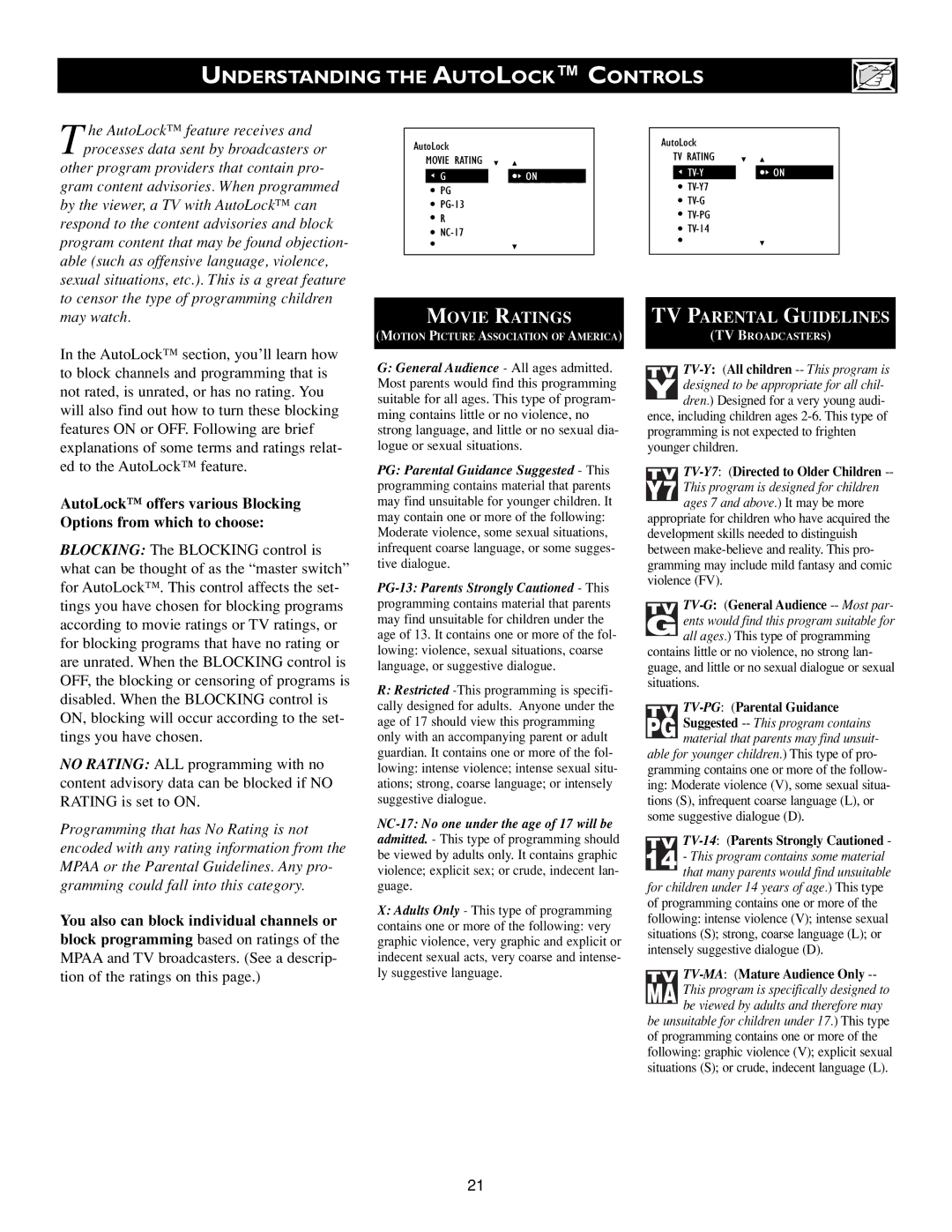
UNDERSTANDING THE AUTOLOCK™ CONTROLS
The AutoLock™ feature receives and processes data sent by broadcasters or
other program providers that contain pro- gram content advisories. When programmed by the viewer, a TV with AutoLock™ can respond to the content advisories and block program content that may be found objection- able (such as offensive language, violence, sexual situations, etc.). This is a great feature to censor the type of programming children
AutoLock |
|
|
| AutoLock |
|
| ||||
|
|
|
| TV RATING |
|
| ||||
| MOVIE RATING |
|
|
|
|
|
| |||
|
|
|
|
|
|
|
|
| ||
|
|
|
|
|
|
|
| ON |
| |
| G |
| ON |
|
|
|
|
| ||
|
|
|
|
|
|
| ||||
| PG |
|
|
|
|
|
| |||
|
|
|
|
|
|
| ||||
|
|
|
|
|
|
| ||||
|
|
|
|
|
|
| ||||
| R |
|
|
|
|
|
| |||
|
|
|
|
|
|
| ||||
|
|
|
|
|
|
| ||||
|
|
|
|
|
|
|
|
| ||
|
|
|
|
|
|
|
|
|
|
|
may watch.
In the AutoLock™ section, you’ll learn how to block channels and programming that is not rated, is unrated, or has no rating. You will also find out how to turn these blocking features ON or OFF. Following are brief explanations of some terms and ratings relat- ed to the AutoLock™ feature.
AutoLock™ offers various Blocking Options from which to choose:
BLOCKING: The BLOCKING control is what can be thought of as the “master switch” for AutoLock™. This control affects the set- tings you have chosen for blocking programs according to movie ratings or TV ratings, or for blocking programs that have no rating or are unrated. When the BLOCKING control is OFF, the blocking or censoring of programs is disabled. When the BLOCKING control is ON, blocking will occur according to the set- tings you have chosen.
NO RATING: ALL programming with no content advisory data can be blocked if NO RATING is set to ON.
Programming that has No Rating is not encoded with any rating information from the MPAA or the Parental Guidelines. Any pro- gramming could fall into this category.
You also can block individual channels or
block programming based on ratings of the MPAA and TV broadcasters. (See a descrip- tion of the ratings on this page.)
MOVIE RATINGS
(MOTION PICTURE ASSOCIATION OF AMERICA)
G:General Audience - All ages admitted. Most parents would find this programming suitable for all ages. This type of program- ming contains little or no violence, no strong language, and little or no sexual dia- logue or sexual situations.
PG: Parental Guidance Suggested - This programming contains material that parents may find unsuitable for younger children. It may contain one or more of the following:
Moderate violence, some sexual situations, infrequent coarse language, or some sugges- tive dialogue.
R:Restricted
X:Adults Only - This type of programming contains one or more of the following: very graphic violence, very graphic and explicit or indecent sexual acts, very coarse and intense- ly suggestive language.
21
TV PARENTAL GUIDELINES
(TV BROADCASTERS)
TV
programming is not expected to frighten younger children.
TV TV-Y7: (Directed to Older Children --
Y7 This program is designed for children ages 7 and above.) It may be more
appropriate for children who have acquired the development skills needed to distinguish between
TV
contains little or no violence, no strong lan- guage, and little or no sexual dialogue or sexual situations.
TV
material that parents may find unsuit- able for younger children.) This type of pro- gramming contains one or more of the follow- ing: Moderate violence (V), some sexual situa- tions (S), infrequent coarse language (L), or some suggestive dialogue (D).
TV
for children under 14 years of age.) This type of programming contains one or more of the following: intense violence (V); intense sexual situations (S); strong, coarse language (L); or intensely suggestive dialogue (D).
TV TV-MA: (Mature Audience Only --
MA This program is specifically designed to be viewed by adults and therefore may
be unsuitable for children under 17.) This type of programming contains one or more of the following: graphic violence (V); explicit sexual situations (S); or crude, indecent language (L).
